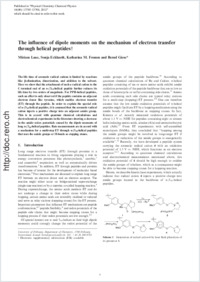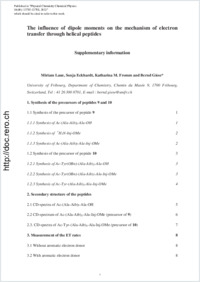The influence of dipole moments on the mechanism of electron transfer through helical peptides
- Lauz, Miriam University of Fribourg, Department of Chemistry, Switzerland
- Eckhardt, Sonja University of Fribourg, Department of Chemistry, Switzerland
- Fromm, Katharina M. University of Fribourg, Department of Chemistry, Switzerland
- Giese, Bernd University of Fribourg, Department of Chemistry, Switzerland
-
2012
Published in:
- Physical Chemistry Chemical Physics. - 2012, vol. 14, no. 40, p. 13785-13788
English
The life time of aromatic radical cations is limited by reactions like β-elimination, dimerization, and addition to the solvent. Here we show that the attachment of such a radical cation to the C-terminal end of an α-/3₁₀-helical peptide further reduces its life time by two orders of magnitude. For PPII-helical peptides, such an effect is only observed if the peptide contains an adjacent electron donor like tyrosine, which enables electron transfer (ET) through the peptide. In order to explain the special role of α-/3₁₀-helical peptides, it is assumed that the aromatic radical cation injects a positive charge into an adjacent amide group. This is in accord with quantum chemical calculations and electrochemical experiments in the literature showing a decrease in the amide redox potentials caused by the dipole moments of long α-/3₁₀-helical peptides. Rate measurements are in accord with a mechanism for a multi-step ET through α-/3₁₀-helical peptides that uses the amide groups or H-bonds as stepping stones.
- Faculty
- Faculté des sciences et de médecine
- Department
- Département de Chimie
- Language
-
- English
- Classification
- Chemistry
- License
-
License undefined
- Identifiers
-
- RERO DOC 31170
- DOI 10.1039/C2CP41159H
- Persistent URL
- https://folia.unifr.ch/unifr/documents/302852
Other files
Statistics
Document views: 102
File downloads:
- pdf: 216
- Supplementary material: 178

